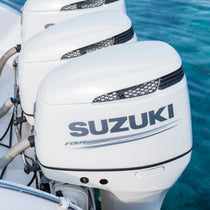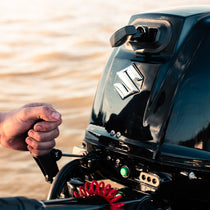Proper maintenance of your Suzuki outboard engine is essential for ensuring its durability and optimal performance. One key aspect of this maintenance is the regular replacement of Suzuki anodes. Understanding the importance of Suzuki anode replacement, knowing where the Suzuki anode locations are, and having the right Suzuki anode kit is essential for every Suzuki outboard owner.
What Are Anodes and Why Are They Important?
Anodes, often called sacrificial anodes, are essential components in marine engines. They are made of metals like zinc, aluminum, or magnesium, which are more reactive than the metal parts of your engine. The primary function of anodes is to protect these metal parts from galvanic corrosion, a process where metal corrodes due to electrochemical reactions in water.
Why Replace Suzuki Anodes?
-
Prevent Corrosion
Suzuki anodes play a crucial role in preventing corrosion of your engine’s vital components. Without functioning anodes, parts like the propeller shaft, gear case, and other components can suffer significant corrosion damage. Corrosion can weaken the metal, causing parts to fail prematurely and potentially leading to dangerous situations while on the water.
-
Ensure Optimal Performance
Corrosion can severely impact the performance of your Suzuki outboard. Regular Suzuki anode replacement ensures that your engine runs smoothly and efficiently. Corroded components can cause friction, reduce fuel efficiency, and lead to overheating. Maintaining fresh anodes ensures your engine operates at peak performance, providing better fuel economy and reliable power output.
-
Extend Engine Life
Regularly replacing Suzuki anodes protects your engine from corrosive damage, extending its lifespan and saving on costly repairs or replacements in the long run. Anodes are relatively inexpensive compared to major engine components, so timely replacement is a cost-effective way to prolong the life of your outboard engine. -
Maintain Warranty Compliance
Corrosion can lead to sudden and unexpected breakdowns, which can be inconvenient and potentially dangerous, especially if you are far from shore. Keeping your Suzuki anodes in good condition reduces the risk of unexpected mechanical failures, ensuring a more reliable boating experience. -
Avoid Unexpected Breakdowns
Many Suzuki outboard engines come with warranties that require regular maintenance to remain valid. Replacing anodes as part of your routine maintenance helps you stay compliant with warranty terms, ensuring you are covered for issues that might arise. Failing to replace anodes could void your warranty, leaving you responsible for expensive repairs. -
Protect InvestmentA Suzuki outboard engine is a significant investment, and regular anode replacement helps protect that investment. Proper maintenance, including anode replacement, ensures that your engine retains its value and remains in good condition for resale or trade-in purposes. Neglecting anode replacement can lead to severe damage that diminishes the engine’s value.
How Often to Replace Suzuki Anodes
Regular Suzuki anode replacement is crucial for maintaining the protection and performance of your outboard engine. The replacement frequency depends on several factors, including the type of water you operate in, how often you use your boat, and the condition of the anodes.
General Anode Replacement Guidelines
- Inspection Frequency: Inspect your anodes at least every three to six months. Regular inspections help you monitor their condition and ensure they are providing adequate protection.
- Saltwater Use: If you operate in saltwater, you may need to replace anodes more frequently, potentially every six months. Saltwater is more corrosive, leading to faster anode consumption.
- Freshwater Use: Anodes typically last longer for freshwater use, and annual replacement might be sufficient. However, inspecting them regularly is essential to catch any signs of excessive wear.
- Brackish Water Use: Operating in brackish water (a mix of salt and freshwater) can require intermediate replacement intervals, such as every nine months. The salinity level in brackish water can vary, affecting anode wear rates.
- Heavy Use: Inspect and replace anodes more often if you use your boat frequently or under demanding conditions. High usage accelerates wear, necessitating more frequent maintenance.
Signs That Anodes Need Replacement
- Significant Wear: If an anode is more than 50% consumed, it’s time to replace it. Waiting until it is completely gone can leave engine components unprotected.
- Uneven Wear: Inspect for uneven wear patterns, which can indicate issues with electrical grounding or the need for additional anodes.
- Corrosion on Protected Parts: If you notice corrosion on parts the anode is supposed to protect, this is a clear sign that the anode needs replacement.
Best Practices
- Keep Spare Anodes: Have spare anodes on hand so you can replace them as needed without delay.
- Document Maintenance: Keep a maintenance log to track inspections and replacements to help you identify patterns and plan future replacements.
- Follow Manufacturer Recommendations: Always follow the manufacturer’s guidelines for your Suzuki outboard model. These recommendations are tailored to ensure optimal protection.
By adhering to these guidelines and regularly inspecting your anodes, you can maintain the integrity and performance of your Suzuki outboard engine, preventing costly repairs and extending its lifespan.
Choosing the Right Suzuki Anode Kit
Selecting the appropriate Suzuki anode kit is essential for ensuring comprehensive outboard engine protection. When choosing a kit, consider the following factors:
- Compatibility: Ensure the kit matches your specific Suzuki outboard model. Different models may have unique anode configurations, and using the wrong anodes can result in inadequate protection. Check your engine’s manual or consult a Suzuki dealer to confirm compatibility.
- Quality: Opt for high-quality anodes from reputable suppliers to ensure durability and effectiveness. High-quality anodes are made with precise compositions that optimize their sacrificial properties. Trusted brands and OEM (Original Equipment Manufacturer) parts are generally the safest choices.
- Comprehensive Coverage: A good Suzuki anode kit should include all necessary anodes for every part of your outboard engine to ensure that no component is left unprotected.
- Ease of Installation: Consider kits with clear instructions and necessary hardware for easy installation. Some kits may include additional items like mounting screws or washers, simplifying the replacement process and reducing the likelihood of improper installation.
- Customer Reviews: Look at customer reviews and ratings for different anode kits. Feedback from other boaters can provide valuable insights into a kit's performance and reliability, helping you make a more informed decision.
- Cost vs. Value: Balance cost with value. High-quality anodes may be more expensive but offer better protection and longer service life, ultimately saving you money on repairs and extending your engine's lifespan.
- Expert Advice: If unsure, seek expert advice from Suzuki dealers, marine mechanics, or experienced boaters. They can provide recommendations based on their knowledge and experience, helping you make an informed decision.
By carefully considering these factors, you can ensure comprehensive and effective protection for your outboard engine, enhancing its performance and longevity while safeguarding your investment.
Final Thoughts on Susuki Anode Replacement
Regular Suzuki anode replacement is vital to maintaining your Suzuki outboard engine. By understanding the importance of Suzuki anodes, understanding replacement timelines, and choosing the right Suzuki anode kit, you can protect your engine from corrosion, ensure optimal performance, and extend its lifespan. Always follow your engine’s manual for specific guidance, and consider consulting a professional for assistance with anode replacement.




















